Main Body
Chapter 8
THE ASSIGNMENT was simple, but interesting. I was to accompany a couple of young movie stars on their tour of personal appearances in a half dozen picture houses. First I was directed to meet them at their hotel and spend some time with them before they started out, to see how they lived, what they ate, how they were dressed. Then I had to follow them around to various social functions.
The movie-house appearances were scheduled for the evening. The first was on Madison Avenue, on the West Side, and it was in my own neighborhood, only two blocks from where I lived.
A big crowd was milling around in front of the theater, and the manager was waiting for us at the door. He led us down the aisle toward the stage, apologizing for the fact that we would have to cross the stage to get to the dressing room, but obviously enjoying the attention of the huge, waiting audience.
“Dressing room” was a grand name for it. It was only a small tent pitched at the other side of the stage. In it the demure little stars — teen-age sisters who dressed alike — were to get into the costumes they had worn in their last picture.
I led the way across the dim stage. In the darkened theater, there was only a single, small square of light, and by some compulsive force my eyes focused there. Looking up at me, deep into my very heart and soul, were two large, luminous brown eyes — the most beautiful I had ever seen.
I forgot everything — where I was — what I was supposed to be doing. I was standing in the middle of the stage before hundreds of people, and blocking the way for two celebrated movie stars who had been charming to me all day. I forgot them completely. I saw only the girl sitting quietly at the piano below the stage, with a slightly troubled expression in those big brown eyes, watching me, wonderingly.
Someone shoved me, and I shuffled forward in a daze.
All else that evening became remote, trivial, unreal. When we left the Madison Theater and went to other movie houses, the brown eyes seemed to follow me.
Somehow I must have gone through all the motions my assignment called for. Somehow the evening eventually came to a close. And somehow, after the celebrated stars had finished their trip around the movie houses and had gone to bed, I found myself back in the Madison Theater. Alone now, and in the last row, sitting as inconspicuously as possible in a corner, I wondered what had hit me.
Girls were a species of human beings of whom up to this moment, except for those in my own
family, I was totally ignorant. My column was full of imaginary and joking references to girls who wanted to flirt with me, and girls I tried to flirt with, but actually I had never had a girl friend. Up to now my job as a newspaper reporter had been the all absorbing passion of my life.
I listened to the girl with the brown eyes playing a piano accompaniment to the pictures that flickered across the screen. Deftly she altered the music to fit the rapidly changing scenes — crescendo for suspense, tenderness for the love scenes, a lively lilt for humor and slapstick. I wanted to move closer, where I could watch her fingers race over the keyboard, and see more than the brown hair tied back with a white ribbon that glimmered from my faraway seat in the dark. But I froze to my seat.
The picture ended. A slide appeared that said, simply and somewhat peremptorily: “GOOD NIGHT.” The house lights came on.
I sat debating whether to leave or to wait while she gathered her music. The debate was settled for me. The manager came over to where I sat and stated in blunt words what I already knew.
“The show is over. The cleaning people want to get to work.”
He made it plain he wanted me to clear out, and I went.
The next night I sat in the same place. Night after night I came. Invariably, I was the first to take my seat, and the last to leave. But I could only sit there and, with pounding heart and eager eyes, look and listen. I knew time was slipping. I knew someone else with more courage and resourcefulness might step in ahead of me — might already have done so.
My work suffered. My sleep at night was negligible. I lost interest in reading. I sat around the house, listless, indifferent. My thoughts were constantly on her: Who was she? Was there a boy friend? If so, could I edge him out? How could I meet her? Should I go right down and talk to her, or arrange to have someone introduce us — and, if so, who in the world could arrange that?
Mother grew concerned about my loss of appetite. Under normal conditions, I had an inordinate interest in her cooking, for even when we had very little in the house, she managed somehow to make our food appetizing. But these were not normal conditions, and I had no thought for food, or for that matter anything else, except the one great interest which now filled my heart.
Finally, after a time, I made a little progress — got up a little more courage. From the secluded corner in the last row, I slowly made my way by the tenth night to the third row in the center — right behind the orchestra pit where she sat at the piano.
That night, a small boy sat next to me, small, bespectacled, serious-minded. He sat intently watching the picture, furiously chewing gum.
“A good picture, isn’t it?” I said, attempting to open a conversation with him.
“Yup,” he said, without turning, and lost himself once more in the entrancing images on the screen.
I sat quietly for a while, then the resolve to do something suddenly struck me. From my vastly superior maturity, and the wide difference of perhaps six years in our ages (he looked to be about eight) I leaned over to the boy at my side and said, grandiosely, “I will give you twenty-five cents, if you will take a note down to the girl at the piano. How about it?”
He looked up at me in the semidark, and his expression was plainly saying, “If you are goofy enough to pay twenty-five cents for that, I’ll do it — it’s your money, but, boy, you must be nuts!”
What he did say was, “Where’s the twenty-five cents, and the note?”
I quickly fished from my pocket a ragged piece of copy paper, the kind used in newspaper offices the world over, and scribbled the note. It said:
“I know it’s bold to do this, but I can’t think of any other way of meeting you. I would like to meet you. Would it be possible for me to see you home after the show tonight?”
The boy took the note and laid it on the piano in front of the girl’s music. She came to a pause, read it, and looked around to see where it came from.
I nodded. She shook her head. And the world slipped out from under me.
My young courier, back at my side, looked at me curiously, decided his original impression was right, shrugged his shoulders –and returned to his preoccupation with the picture.
Miserable and defeated, I sat, still looking with my heart in my eyes at the girl for whom I would at that moment — and at any time all through life later have given everything.
Before I knew it the show had ended. The familiar “GOOD NIGHT,” which had become a curt intrusion upon my nightly adventure, appeared on the screen. I should have gone out then, but I didn’t. The house lights came on, and there I was, trapped in the third row just behind her — bewildered and embarrassed.
She turned around, and smiled. With perhaps the greatest demand I have ever made upon my courage, I got up and made my way down to the seat nearest her. Once there, my courage and my voice left me simultaneously.
“I am sorry,” I heard her say, her quiet, warm voice so singularly suited to her eyes. “I am very sorry, but my father is here to take me home tonight.”
My heart became light — my hopes restored, my courage revived, my adoration multiplied.
“Could I — would you — perhaps, maybe tomorrow night?” I ventured.
“I don’t know,” she said. “Somebody from the family always sees me home. You could walk home with us, if you wished.”
I “wished” profoundly, and said so, quickly. I would walk with her father and mother and sister and anyone else — if only it gave me a chance of meeting her.
Tomorrow night finally came. The show was unbelievably long, but at last it ended. I waited by the piano until she arranged her music. My heart was in my mouth, and it would have gotten in the way of my words if I had had any words.
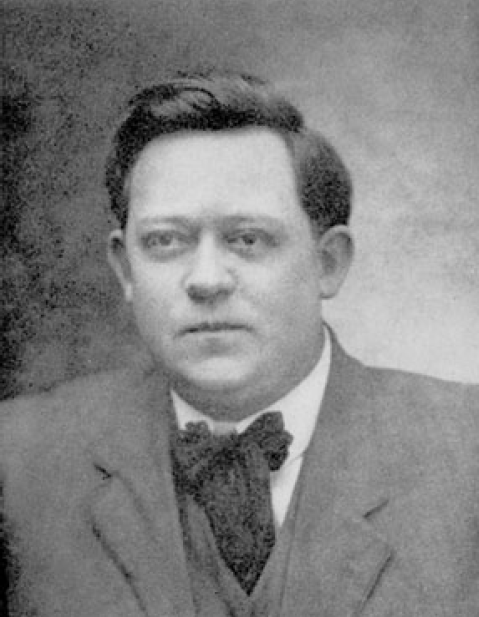
(1910)
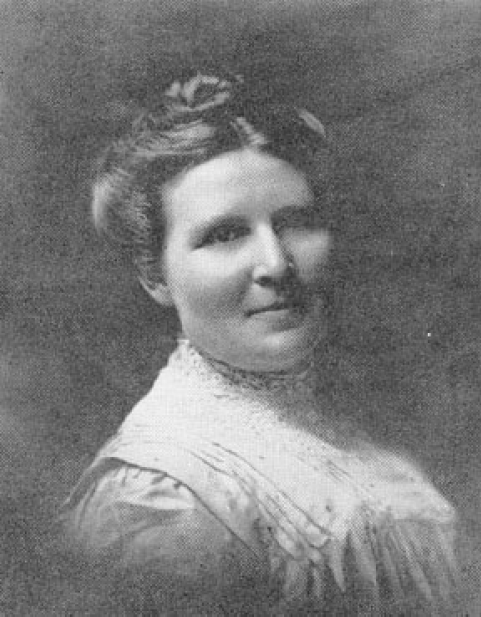
(1896)
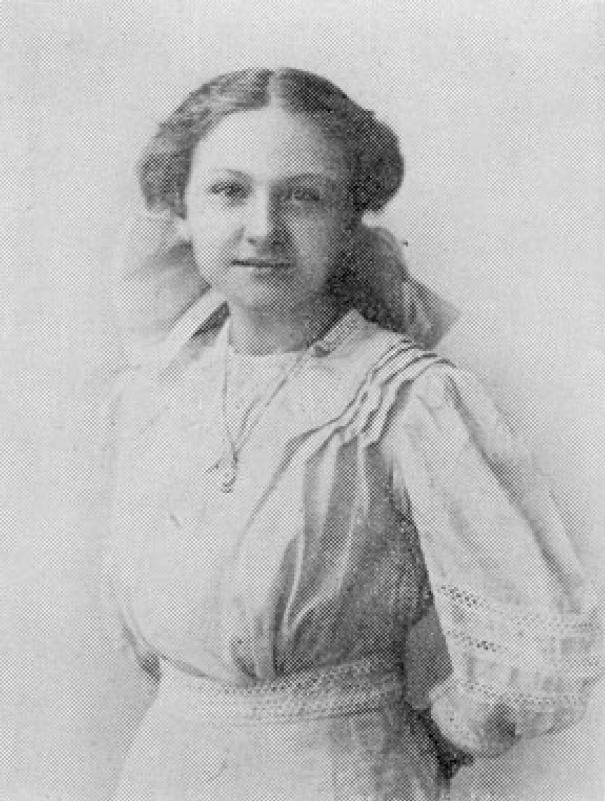
the time Louis B. Seltzer met
her (1912)
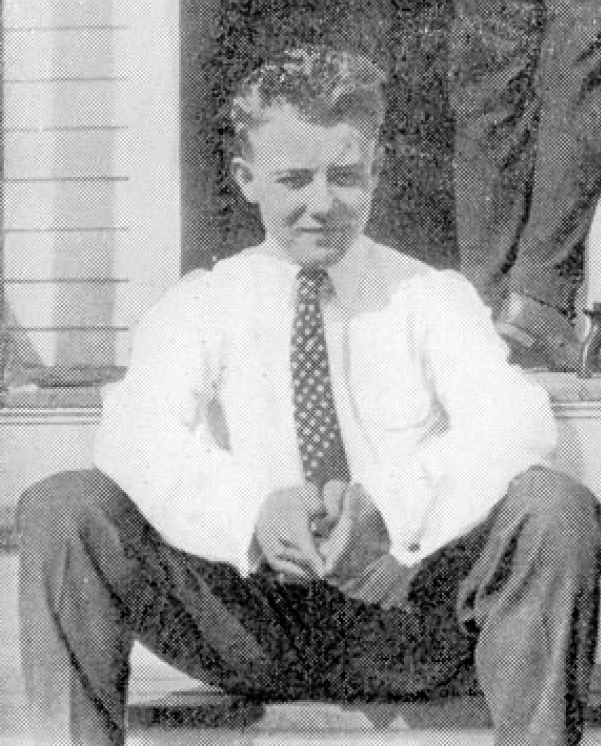
man and Police Reporter
for The Cleveland Press
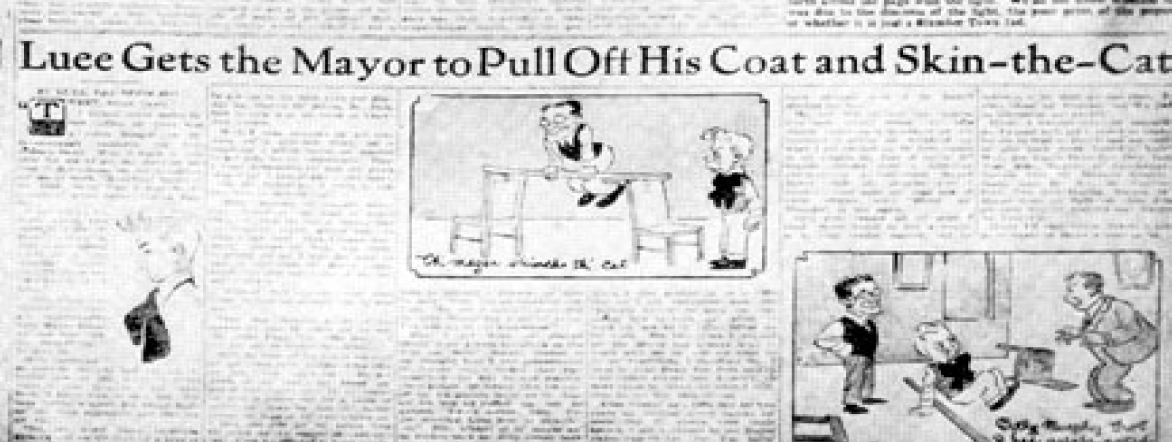
“I don’t even know your name,” she said. “Mine is Marion.”
I told her my name, hoping that she would recognize it from the paper, but she didn’t. It meant nothing to her.
I took her music and followed her up the aisle, stumbling and almost falling on the rubber matting. She noticed it, and reached out her hand to help me. I already knew she was the kind of person who would always do something like that.
She led me to her mother, who was sitting in the last row, waiting for her. When she introduced me, she added something that made my pride swell: “He seems like a very nice boy.”
Marion’s mother impressed me then, as she always did afterward, with her regal look and bearing, and the innate goodness which shone in her eyes and face. I felt suddenly relaxed.
I had no trouble finding things to say during the short walk to their home. The night was clear. The stars were bright. Everything about it seemed wonderful to me. We talked about the show and her music. I told her about the column I wrote for The Sunday Leader and she now remembered having read it. She remembered the night I had walked across the darkened stage.
“It was because I saw you that night that I thought it would be all right to see you,” she said.
When we reached her home, her father was still up. He was a genial, bald-headed man, whose fringe of white hair gave him the look of “Foxy Grandpa,” a beloved comic character which appeared in our paper. To make conversation I said so, and he laughed. I liked his laugh.
Like my own father, he was a carpenter by trade, and like him, he had gone through hard times. In fact, he was out of work now. Marion’s income as a movie pianist was helping the family. I knew it would be another bond between us when I told her that I, too, had gone to work to help our family.
I knew I should leave, yet I couldn’t, and Marion’s mother finally had to send me away. But I walked up the street with my heart singing, for I would see her again the next night. I knew then, even if I was only fourteen, that this was the girl of my life; and the fact that she was the first and only girl I had ever known seemed like a blessing given me by God.
The next morning I was gay and happy. Mother watched me in surprise as I devoured my breakfast. Father was astonished at the change and said so, asking me how I explained it. I didn’t. I knew they would think I was too young to fall seriously in love – – and, as it turned out later, they did. For the time being, I thought it better to say nothing. I would wait until I was sure of Marion — and the mere thought of not being sure, and its implication, sent a cold chill through me.
When I went to work, Howard Denby looked at me. “What’s happened to you, young man?” he asked. “We began to think you were never coming out of it.”
“Out of what?” I asked.
“Out of that blue funk you’ve been in for the last couple of weeks,” he said. “Even your writing showed it. I was intending to talk to you about it.” I put everything into the column I wrote that day, and Howard Denby complimented me on it. “Well,” he said, “this is more like it.”
When I finished my column, I had an irresistible impulse. I would write my first letter to Marion. I rolled another long sheet of copy paper into my typewriter and told her about myself, things that were for me easier to write than to tell. I paused only over the problem of how to address her at the beginning, and how to sign myself at the end. I decided just to write it like a letter to anyone, although it seemed cold and formal when set down that way. Then I rushed over to the Post Office, where I put a special delivery stamp on it.
That night, when I saw her, I wondered whether she had gotten it — and what she thought. “You do things in a hurry, don’t you?” was her comment. But she was pleased.
A lot of copy paper was mailed to Marion after that. It was one letter a day when I saw her every night.
When I didn’t, it was two or three — once as many as five!
It was a year or so later, during the big storm of 1913 which tied the whole city up as tight as a drum, that we really spent a lot of time together. By this time my parents knew Marion, and by this time I was working nights again. Marion had left school — for the same reason I had — and had a job in the music department of the May Company. At night she still played the piano, and we often had trouble finding time to meet.
The big storm of 1913 put all the power out of commission. No streetcars ran. No papers were published. Everything stopped. It was like a holiday for Marion and me, the happiest of the many happy times we have had together. It was then that we decided one day we would marry. We were only sixteen and we would have to wait; but we made up our minds.
A little less than two years later we decided we had waited long enough. Our problem was to get the consent of our parents, since their legal approval was necessary.
“You are both so young,” Father protested.
“Especially you, Louis. Girls sometimes marry before they are eighteen, but a boy of your age — why don’t you wait?”
“We don’t want to wait, Father,” I said. “I have been old enough to be working for a long time now. I’m old enough to marry.”
Father hesitated. He looked at Mother, and then said, “All right, you know what you are doing, Louis. You have been out in the world much earlier than most boys, and I think you have grown up faster.”
The rest of this chapter could be told, in similar words, by many hard-working young couples who were making their way in our enterprising young city in 1915. But since it happened to me, I will tell it.
The day that we were to be married, we went to work, Marion at May’s and I to the paper, having arranged to meet during the lunch hour to get the license. Bill Bastian, one of the license clerks at the Court House, was a close friend, and he was nice enough to hold up his lunch hour to wait for us.
The marriage license fee was seventy-five cents. I didn’t have it. After paying my streetcar fare that morning, I had only eleven cents left in my pocket. Before my embarrassment could become acute, Marion calmly reached into her pocketbook, and gave me seventy-five cents.
“I’ll pay it back,” I told her, as I squeezed her hand. Then I suddenly began to worry. “Do we have enough streetcar fare between us to get home?”
Marion said, “Just enough,” as she happily tucked our license into her pocketbook.
When I got back to the office I called Dr. Dan F. Bradley, pastor of the Plymouth Congregational Church on West Fourteenth Street. He was one of the city’s foremost ministers, and had been a good friend to me, often giving me the benefit of his wonderful philosophy. I had interviewed him many times, but this time, I explained, I was not asking for any statements. My heart warmed at his response when I asked for a quiet wedding at his home that night.
He lived only about two blocks from the movie where Marion was now playing the piano, and after the show ended we walked over there, a little nervous, and very happy. There was a bright light burning at the front of the house, and Dr. Bradley opened the door as we climbed the front steps. We sat down and talked for a few moments — until Mrs. Bradley said, “Dan, these young people didn’t come here tonight to listen to you. They came to be married — remember?”
Dr. Bradley chuckled and got up. He was a tall, thin man, who looked rather like Abraham Lincoln and had the same kindly and compassionate way.
We stood by the piano in his front room. I thought it was somehow symbolic of our first meeting. I remembered the few clumsy words I first spoke to Marion, standing by the piano in the
Madison Theater.
The words were more impressive now: “For better, or for worse, through sickness and in poverty, until death do you part.” They burned themselves deep into my consciousness. From now on for the rest of our lives we would care for each other — make our home, have our children, make our way together.
“I know somehow that you two will be happy together,” Dr. Bradley said. He smiled toward his wife. “We can usually tell, can’t we, Mother?”
From the sidewalk we waved back at them as they stood in the doorway watching us. Together, arm in arm, unable to put our happiness into words, we made our way to the streetcar. On the streetcar, alone except for a man up front sound asleep, we talked and planned and hugged each other — for the first time since our marriage.
There was neither time nor money for a honeymoon for us. We stayed that night in the apartment of Marion’s sister, which was in the same terrace where her parents lived, only a few doors away.
In the morning at my usual hour of six I got up and went to work. But by then it was a different job, for I have gotten ahead of my story. At the time I first met Marion, I was still writing as Luee, The Offis Boy, for the Sunday edition of The Leader. Not long afterward, I was assigned as a police reporter at $15 a week.
